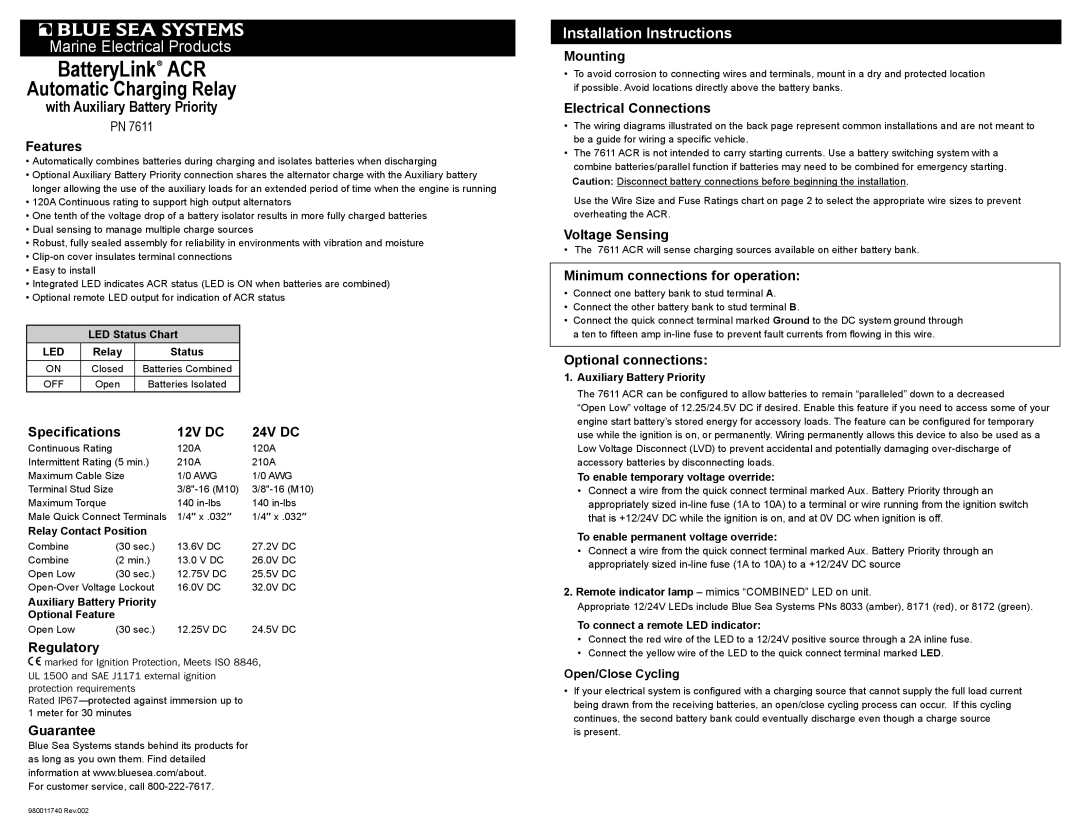
Marine Electrical Products
BatteryLink® ACR
Automatic Charging Relay
with Auxiliary Battery Priority
PN 7611
Features
•Automatically combines batteries during charging and isolates batteries when discharging
•Optional Auxiliary Battery Priority connection shares the alternator charge with the Auxiliary battery longer allowing the use of the auxiliary loads for an extended period of time when the engine is running
•120A Continuous rating to support high output alternators
•One tenth of the voltage drop of a battery isolator results in more fully charged batteries
•Dual sensing to manage multiple charge sources
•Robust, fully sealed assembly for reliability in environments with vibration and moisture
•
•Easy to install
•Integrated LED indicates ACR status (LED is ON when batteries are combined)
•Optional remote LED output for indication of ACR status
LED Status Chart
LED | Relay | Status |
ON | Closed | Batteries Combined |
OFF | Open | Batteries Isolated |
Specifications | 12V DC | 24V DC | |
Continuous Rating |
| 120A | 120A |
Intermittent Rating (5 min.) | 210A | 210A | |
Maximum Cable Size | 1/0 AWG | 1/0 AWG | |
Terminal Stud Size |
| ||
Maximum Torque |
| 140 | 140 |
Male Quick Connect Terminals | 1/4″ x .032″ | 1/4″ x .032″ | |
Relay Contact Position |
|
| |
Combine | (30 sec.) | 13.6V DC | 27.2V DC |
Combine | (2 min.) | 13.0 V DC | 26.0V DC |
Open Low | (30 sec.) | 12.75V DC | 25.5V DC |
16.0V DC | 32.0V DC | ||
Auxiliary Battery Priority |
|
| |
Optional Feature |
|
|
|
Open Low | (30 sec.) | 12.25V DC | 24.5V DC |
Regulatory
Emarked for Ignition Protection, Meets ISO 8846, UL 1500 and SAE J1171 external ignition protection requirements
Rated
Guarantee
Blue Sea Systems stands behind its products for as long as you own them. Find detailed information at www.bluesea.com/about.
For customer service, call
Installation Instructions
Mounting
•To avoid corrosion to connecting wires and terminals, mount in a dry and protected location if possible. Avoid locations directly above the battery banks.
Electrical Connections
•The wiring diagrams illustrated on the back page represent common installations and are not meant to be a guide for wiring a specific vehicle.
•The 7611 ACR is not intended to carry starting currents. Use a battery switching system with a combine batteries/parallel function if batteries may need to be combined for emergency starting. Caution: Disconnect battery connections before beginning the installation.
Use the Wire Size and Fuse Ratings chart on page 2 to select the appropriate wire sizes to prevent overheating the ACR.
Voltage Sensing
• The 7611 ACR will sense charging sources available on either battery bank.
Minimum connections for operation:
•Connect one battery bank to stud terminal A.
•Connect the other battery bank to stud terminal B.
•Connect the quick connect terminal marked Ground to the DC system ground through a ten to fifteen amp
Optional connections:
1.Auxiliary Battery Priority
The 7611 ACR can be configured to allow batteries to remain “paralleled” down to a decreased
“Open Low” voltage of 12.25/24.5V DC if desired. Enable this feature if you need to access some of your engine start battery’s stored energy for accessory loads. The feature can be configured for temporary use while the ignition is on, or permanently. Wiring permanently allows this device to also be used as a Low Voltage Disconnect (LVD) to prevent accidental and potentially damaging
To enable temporary voltage override:
•Connect a wire from the quick connect terminal marked Aux. Battery Priority through an appropriately sized
To enable permanent voltage override:
•Connect a wire from the quick connect terminal marked Aux. Battery Priority through an appropriately sized
2.Remote indicator lamp – mimics “COMBINED” LED on unit.
Appropriate 12/24V LEDs include Blue Sea Systems PNs 8033 (amber), 8171 (red), or 8172 (green).
To connect a remote LED indicator:
•Connect the red wire of the LED to a 12/24V positive source through a 2A inline fuse.
•Connect the yellow wire of the LED to the quick connect terminal marked LED.
Open/Close Cycling
•If your electrical system is configured with a charging source that cannot supply the full load current being drawn from the receiving batteries, an open/close cycling process can occur. If this cycling continues, the second battery bank could eventually discharge even though a charge source
is present.
980011740 Rev.002
